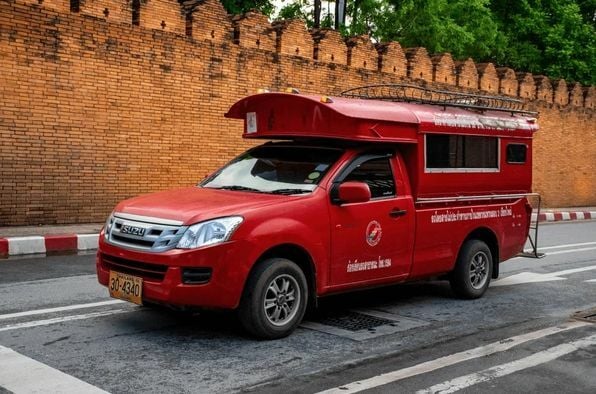Chiang Mai red trucks decline as Grab gains ground

Chiang Mai’s iconic red trucks, an integral part of the city’s transport network, are facing an existential threat in the wake of declining patronage post-tourist season, with concerns over the future being reduced to mere photographic memories.
The rise of international ride-hailing services such as Grab or Bolt has compounded the issue, leading to a significant drop in customers for the red trucks, traditionally known as rot daeng.
The situation has become a topic of widespread discussion on social media platforms such as Facebook, especially in local groups where users have expressed their woes and called for collective efforts to revive the red trucks’ fading legacy.
Despite innovative ideas like air-conditioned red trucks which once received a warm welcome from commuters, the present scenario paints a bleak picture. The competition posed by Grab is especially challenging for the older generation, many of whom are retired and rely on driving red trucks for their livelihood.
The decline in customers post-tourist season has left some contemplating selling their vehicles or facing the financial burden of returning them if they are leased.
The public outcry extends beyond just the competition, many comments critique the red trucks’ service, especially the lack of standardised fares.
Unjustly treated
One Facebook user recounted an experience from seven years ago that left a lasting negative impression. The driver had agreed on a fare but then abruptly stopped to pick up a foreign passenger instead, leaving the user stranded and feeling unfairly treated.
Another user highlighted the inconsistent fare structure, where they were charged 100 baht for a short journey and others paid only 40 baht for a longer distance. This instance of apparent overcharging for being an outsider has led to a loss of trust in the red truck system.
Other anecdotes include drivers quoting exorbitant rates for short trips or varying prices for the same route, leading to a resolution by some never to use the red trucks again, reported Khaosod.
These sentiments, albeit anecdotal, reflect a broader discontent with the red truck services, pointing to the need for improvements in driver conduct and fare regulation to regain the trust and patronage of locals and visitors alike to compete with taxi service applications that are quickly establishing themselves within the market.
The red trucks, once a charming and practical aspect of Chiang Mai‘s transport culture, now stand at a crossroads, with the community calling for action to prevent their decline from becoming irreversible.
Latest Thailand News
Follow The Thaiger on Google News:


























